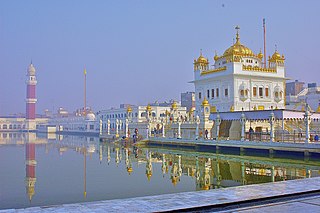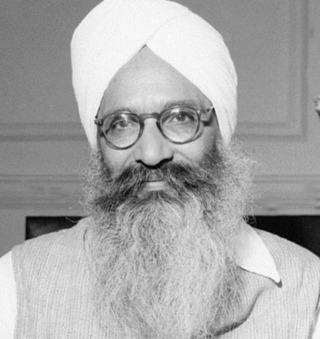
Pratap Singh Giani was a Sikh academician, scholar and calligraphist.

Chaudhary Devi Lal was an Indian statesman and politician who served as 6th Deputy Prime Minister of India from 1989 to 1990 and from 1990 to 1991. Lal emerged as farmer leader from the state of Haryana, and served as the Chief Minister of Haryana from 1977 to 1979 and then from 1987 to 1989.He was the founder of Indian National Lok Dal. He was popularly known as Tau, meaning uncle.

Tarn Taran Sahib is a city in the Majha region of the state of Punjab, in northern India. It is the district headquarters and hosts the municipal council of Tarn Taran district. Gurdwara Sri Tarn Taran Sahib, a prominent Sikh shrine is located in the central part of the city.
Although India is a parliamentary democracy, the country's politics has become dynastic or with high level of nepotism, possibly due to the absence of party organizations, independent civil-society associations which mobilize support for a party, or centralized financing of elections. The dynastic phenomenon is present at the national, state, regional, and district level. The Nehru–Gandhi family has produced three Indian prime ministers, and family members have largely led the Congress party since 1978. The ruling Bharatiya Janata Party (BJP) has no senior dynastic leaders. In addition to the major national parties, other national and regional parties such as Shiromani Akali Dal, Shiv Sena, Samajwadi Party, Rashtriya Janata Dal, Janata Dal Secular, Jharkhand Mukti Morcha, Dravida Munnetra Kazhagam, Kerala Congress, Jammu & Kashmir National Conference, Indian Union Muslim League, AIMIM, and the Nationalist Congress Party are all dominated by families, mostly those of the party founders.

Majha is a region located in the central parts of the historical Punjab region split between India and Pakistan. It extends north from the right banks of the river Beas, and reaches as far north as the river Jhelum. People of the Majha region are given the demonym "Mājhī" or "Majhail". Most inhabitants of the region speak the Majhi dialect, which is the basis of the standard register of the Punjabi language. The most populous city in the area is Lahore on the Pakistani side, and Amritsar on the Indian side of the border.

Partap Singh Kairon was the Chief Minister of the Punjab province, and is widely acknowledged as the architect of post-Independence Punjab Province. Moreover, he was an Indian independence movement leader. He was jailed twice by the British Empire, once for five years for organizing protests against British rule. His political influence and views are still considered to dominate politics in Punjab.

Baba Gurdit Singh was the central figure in the Komagata Maru incident of 1914, one of several incidents in the history of early 20th century involving exclusion laws in both Canada and the United States designed to keep out immigrants of only Asian origin.

Harcharan Singh Brar was an Indian politician belonging to the Punjab unit of Indian National Congress. He was the 13th Chief Minister of Punjab and held this position from 31 August 1995 to 21 November 1996. He succeeded the assassinated Chief Minister Beant Singh. At the time he was member of Punjab Vidhan Sabha from Muktsar Assembly Constituency.

Adesh Pratap Singh Kairon is a politician from Punjab, India. He is a four-time Member of Legislative Assembly in the Punjab Legislative Assembly from the Patti Constituency. He has served thrice as a minister. He has held the portfolios of Excise and Taxation, Food and IT.
Surinder Singh Kairon was an Indian politician from Punjab. He was a member of Indian National Congress and represented Taran Taran in 10th Lok Sabha. He was son of ex-chief minister of Punjab, Partap Singh Kairon. He was a member of Punjab Vidhan Sabha before being elected to the Lok Sabha. His son Adesh Partap Singh Kairon is married to Parkash Singh Badal's daughter Preneet Kaur. He died after suffering a massive cardiac arrest in Amritsar on 16 March 2009.

Raja Rao Birender Singh was a King of erstwhile state of Haryana and an Indian politician. He served first as a minister in the state government of Punjab and then as Chief Minister of Haryana, and also served as a minister in Punjab state, Haryana state and the Union cabinet. He also served as the second speaker of Haryana state assembly in 1967. He coined an Indian political vocabulary Aya Ram, Gaya Ram to describe the practice of frequently floor-crossing by legislature.
The list of members of political families of Punjab, India

Parkash Singh Badal is an Indian politician who was Chief Minister of Punjab state from 1970 to 1971, from 1977 to 1980, from 1997 to 2002, and from 2007 to 2017. He is also the patron of Shiromani Akali Dal (SAD), a Sikh-centered regional political party. He was the president of the party from 1995 to 2008, when he was replaced by his son Sukhbir Singh Badal. As the patron of SAD he exercises a strong influence on the Shiromani Gurdwara Parbandhak Committee and Delhi Sikh Gurdwara Management Committee. The Government of India awarded him the second-highest civilian award, Padma Vibhushan, in 2015.
Sukhbir Singh Badal is an Indian politician and the president of Shiromani Akali Dal, and is currently a member of Parliament from the Firozpur. He served as Deputy Chief Minister of Punjab from 2009 to 2017. He is the son of Parkash Singh Badal, who has served several times as Chief Minister of Punjab. Badal and his family have ownership stakes in an array of businesses.
Gurbakshish Singh (1911-1983) was an Indian politician. He was Member of the Legislative Assembly (MLA) who represented the Barnala Constituency, in Punjab.

Gurbrinder Kaur Brar was an Indian National Congress (INC) politician from the state of Punjab, India.

The 1952 Punjab Legislative Assembly election were the First Vidhan Sabha elections of the state when the Indian National Congress emerged as the largest party with 96 seats in the 126-seat legislature in the election. The Shiromani Akali Dal became the official opposition, holding 13 seats.
The 1962 Punjab Legislative Assembly election was the Third Vidhan Sabha election of the state when the Indian National Congress emerged as the largest party with 90 seats in the 154-seat legislature in the election. The Shiromani Akali Dal became the official opposition, holding 16 seats. From 5 July 1966 to 1 November 1966, Assembly was under suspension.
The 1969 Punjab Legislative Assembly election was the fifth Vidhan Sabha election of the state. This was the second hung assembly. Shiromani Akali Dal emerged as the largest party with 43 seats in the 104-seat legislature in the election. The Indian National Congress became the second, holding 38 seats. On 13 June 1971, Assembly dissolved prematurely and president rule was imposed.













